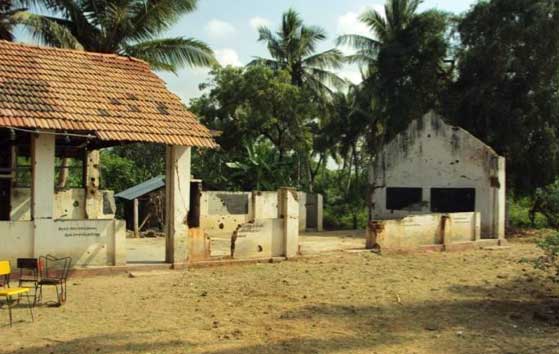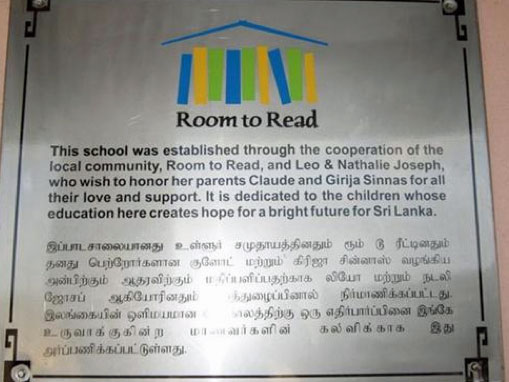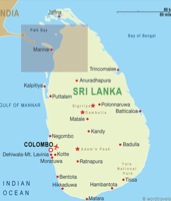The Pappamodai School was completed in 2011

The New School

Students in their new school
The Community: The school is located in the village of Pappamodai, Mannar District. This district, one of five administrative districts in the Northern Province, is located in northwestern Sri Lanka. It covers 2,002 square kilometers, approximately 3% of the total land area of Sri Lanka. Geographically, the bulk of Mannar lies on the mainland within the arid and dry zone. High temperatures and low rainfall characterize the climate. The monthly temperatures range between 26.5°C and 30.0°C, with highs normally recorded between May and August. Mannar receives nearly 60% of its rainfall during the northeast monsoon, which lasts from October through December. The land area is relatively flat and sits at low elevations. Across the region's gently undulating terrain, rainwater is stored in tanks and used for irrigation of arable land. Crop cultivation (primarily paddy), fisheries and animal husbandry support most people in Mannar. Employment opportunities in the district are highly seasonal, and there are no institutional facilities for tertiary education. The district is inhabited by members of various communities, though the Tamil-speaking community is the most prevalent.
The last thirty years of conflict in the region have compelled the displacement and destruction of large segments of the area's population. War has destroyed the region's infrastructure, displacement has left communities without maintenance, and the jungle has swallowed formerly populated areas.
The residents of Pappamodai are very poor due to the decades-long war. Displaced on multiple occasions, these villagers have lost their houses, their belongings, and many of their loved ones as well. For the last thirty years, these people have been living in uncertainty, with no opportunity to gain wealth. There are no concrete structures in the village. The shelters consist of temporary tin sheet sheds built by the government or INGOs. The villagers are dependent on cultivation as their main source of income. Drinking water is obtained from dug wells, and the village is without an electricity supply. Presently the government is involved in de-mining the village and rebuilding the infrastructure.
The last thirty years of conflict in the region have compelled the displacement and destruction of large segments of the area's population. War has destroyed the region's infrastructure, displacement has left communities without maintenance, and the jungle has swallowed formerly populated areas.
The residents of Pappamodai are very poor due to the decades-long war. Displaced on multiple occasions, these villagers have lost their houses, their belongings, and many of their loved ones as well. For the last thirty years, these people have been living in uncertainty, with no opportunity to gain wealth. There are no concrete structures in the village. The shelters consist of temporary tin sheet sheds built by the government or INGOs. The villagers are dependent on cultivation as their main source of income. Drinking water is obtained from dug wells, and the village is without an electricity supply. Presently the government is involved in de-mining the village and rebuilding the infrastructure.

An existing classroom damaged during the war

A typical home in the village
Current Situation and the Need for Support: The existing school is comprised of two buildings. One building was totally damaged during the war and the other was partly damaged. The school teaches students up to the ninth grade, but senior and junior students are taught together due to the lack of space. Because the classrooms lack partition walls, the children are easily distracted and the teachers have difficulty conducting classes. Often, classes are held outdoors under the trees.
The remaining building has been partly damaged, causing the roof to leak in many places. The lack of furniture and other facilities have discouraged the parents and, as a result, many children are not sent to school. Since the development of infrastructure is necessary to encourage resettlement in the village, officials from the Department of Education have enlisted Room to Read to provide a suitable building for their primary school children.
The remaining building has been partly damaged, causing the roof to leak in many places. The lack of furniture and other facilities have discouraged the parents and, as a result, many children are not sent to school. Since the development of infrastructure is necessary to encourage resettlement in the village, officials from the Department of Education have enlisted Room to Read to provide a suitable building for their primary school children.
The new primary school building is approximately 2500 square feet. It is a spacious building with plenty of light and good ventilation and is an attractive addition to the community. The exterior of the building is painted to match the existing buildings at the school. The single-story building has five classrooms in addition to storage facilities. There are built-in wall cupboards, which the teachers use for displaying various educational materials donated by Room to Read. Room to Read has provided 200 student tables, 200 student chairs, and 5 sets of tables and chairs for the teachers.

Due to ethnic conflict in north, the total school building was damaged in the war during 2008. So primary school children’s classes were conducted in temporary shelters and partly damaged building that was lacking facilities including land. During rainy days, the classes could not be conducted as the roof leaked in many places. The school management faced many problems due to the lack of quality learning space and land space. We had requested a new building from the Department of Education, but they did not have the funds to help us. However, they made a request to Room to Read on our behalf. With Room to Read’s contribution we have been able to complete a new building with modern facilities and a playground in a new place. Parents are eager to send their children to school and make use of the school and the students willing to come to school. We thank Room to Read and the donor, who have given unconditional support and showed great faith in us.
- Mr. Mariya Loorthaharan, the school principal
